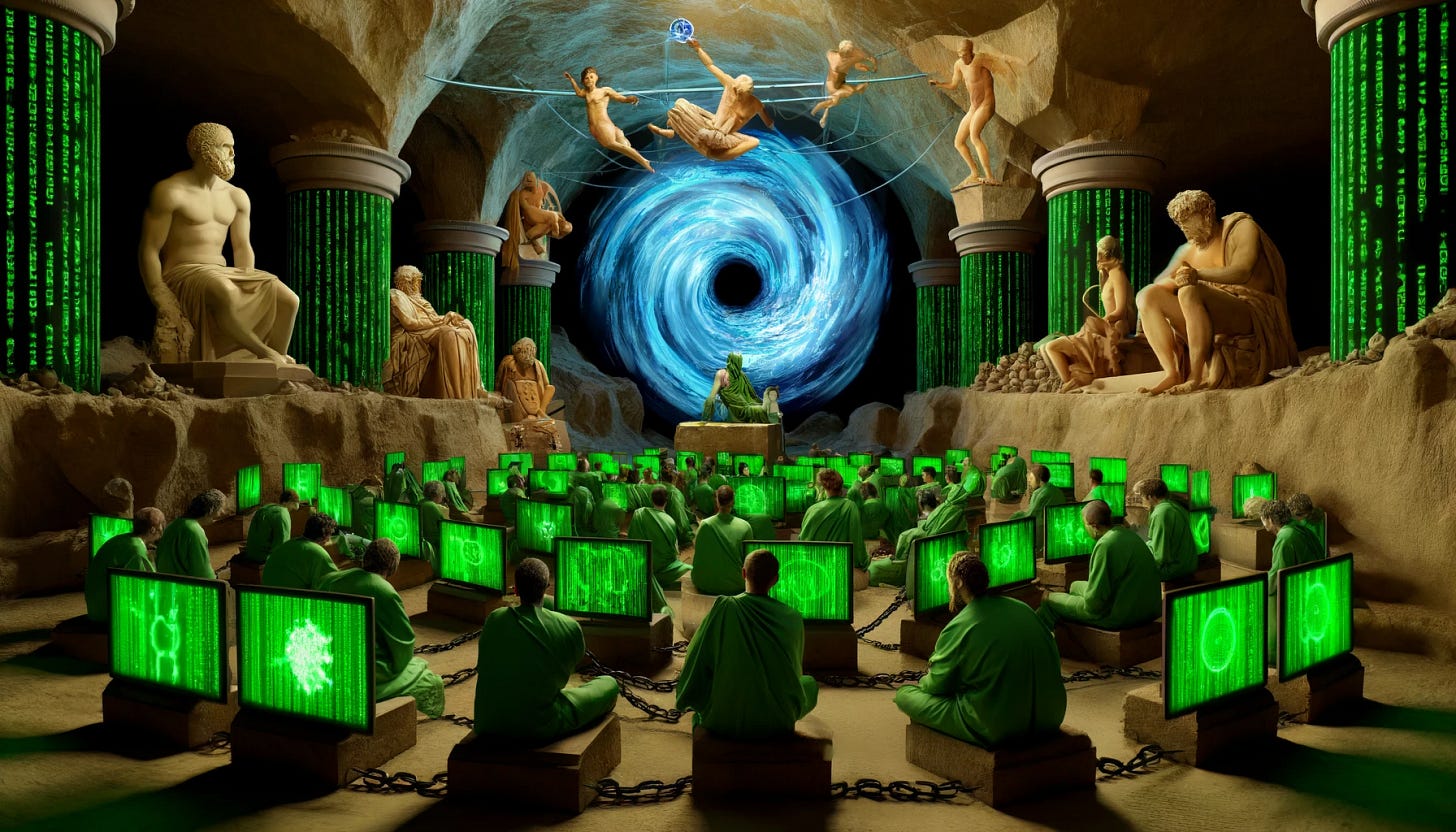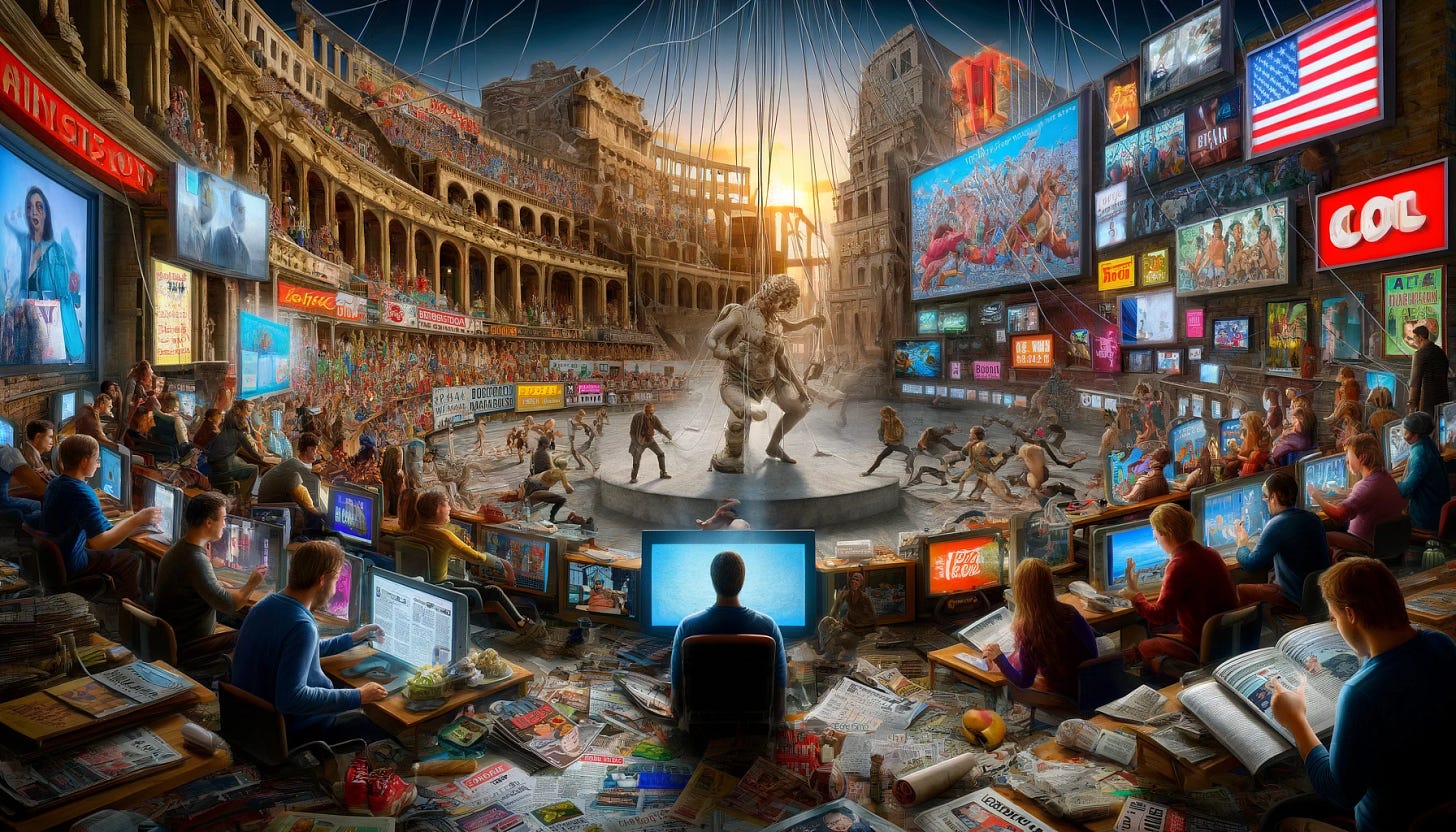Reality Tunnels
The Rise Of Individual "Realities"
Part of the Sorcerer’s Apprentice series. Originally released privately on January 13, 2021 as part of a comprehensive white paper. Updated and revised for public release on June 3, 2024, with previously omitted content restored for completeness, edits to improve readability, and enhanced graphics.
In early 2021—amidst the upheaval of the COVID-19 pandemic—we found ourselves reflecting on the profound shifts in society and the increasingly blurred lines between what is real and what is not. Now, in 2024—as we navigate the post-pandemic world and witness the meteoric rise of artificial intelligence (AI) tools like ChatGPT—the ideas we contemplated in 2021 have only grown more relevant. Previously, we examined how the current assault on reality differs from historical challenges, fracturing the very foundations of our shared illusion. As we grapple with this unparalleled fragmentation, the concept of “reality tunnels” offers a lens for understanding our predicament.
Shattering Of Consensus Reality
“Reality is always plural and mutable”
—Robert Anton Wilson, Cosmic Trigger
In the labyrinthine depths of our fractured society, the very nature of reality has become a battleground. In Echoes of the Cave, we explored how the current onslaught against truth and consensus reality differs from past challenges. While luminaries like Plato and the Buddha recognized reality as an illusion, they understood it to be primarily a shared illusion—a common tapestry of experience that binds us together. Even when reality was distorted or manipulated in the past, as described by Orwell, the manufacturing of consent still operated within the framework of this shared reality.
In stark contrast, what we are witnessing now is the utter fragmentation of this shared illusion into countless individual “realities”. It's as if Plato's Cave has been subdivided—with each prisoner confined to their own personal chamber—staring at a unique wall upon which entirely different shadows are being cast
The intensity, speed, and pervasiveness of this assault on consensus reality are utterly unprecedented. What is occurring today goes beyond the mere shaping of opinions or the manufacturing of consent; we are seeing the wholesale erosion of the very foundations upon which societies have traditionally relied to function and progress.
Media Curated Realities
Media, social media, and tech conglomerates poured fuel on an already-raging conflagration in 2020 by appointing themselves the ultimate arbiters of “truth”—brazenly censoring non-approved information and perspectives without even attempting to conceal their actions.
Consider the issue of election fraud: the salient point here is not whether fraud occurred, but rather the capacity to shape consensus reality (i.e., to determine what is considered real and unreal). By curating the information we see and suppressing dissenting perspectives, they have exacerbated self-reinforcing echo chambers that confirm and intensify our preexisting beliefs, thereby amplifying and accelerating the fragmentation of reality.
Huxley’s Haunting Foresight: Distraction As Control
Aldous Huxley’s Brave New World—published in 1932—was remarkably prophetic in predicting the specifics of a dystopian future society, which he further explored in Brave New World Revisited:
In regard to propaganda the early advocates of universal literacy and a free press envisaged only two possibilities: the propaganda might be true, or it might be false. They did not foresee what in fact has happened…the development of a vast mass communications industry, concerned…neither with the true nor the false, but with the unreal, the more or less totally irrelevant. In a word, they failed to take into account man’s almost infinite appetite for distractions…
For conditions even remotely comparable to those now prevailing we must return to imperial Rome, where the populace was kept in good humor by frequent, gratuitous doses of many kinds of entertainment - from poetical dramas to gladiatorial fights, from recitations of Virgil to all-out boxing, from concerts to military reviews and public executions.
But even in Rome there was nothing like the non-stop distraction now provided by newspapers and magazines, by radio, television and the cinema. In Brave New World non-stop distractions of the most fascinating nature…are deliberately used as instruments of policy, for the purpose of preventing people from paying too much attention to the realities of the social and political situation.
The other world of religion is different from the other world of entertainment; but they resemble one another in being most decidedly “not of this world.” Both are distractions and, if lived in too continuously, both can become, in Marx’s phrase, “the opium of the people” and so a threat to freedom. Only the vigilant can maintain their liberties, and only those who are constantly and intelligently on the spot can hope to govern themselves effectively by democratic procedures.
A society, most of whose members spend a great part of their time, not on the spot, not here and now and in the calculable future, but somewhere else, in the irrelevant other worlds of sport and soap opera, of mythology and metaphysical fantasy, will find it hard to resist the encroachments of those who would manipulate and control it. In their propaganda today’s dictators rely for the most part on repetition, suppression and rationalization - the repetition of catchwords which they wish to be accepted as true, the suppression of facts which they wish to be ignored, the arousal and rationalization of passions which may be used in the interests of the Party or the State.
As the art and science of manipulation come to be better understood, the dictators of the future will doubtless learn to combine these techniques with the non-stop distractions which, in the West, are now threatening to drown in a sea of irrelevance the rational propaganda essential to the maintenance of individual liberty and the survival of democratic institutions.
Huxley painted a chilling picture of a future society in which truth is obscured and the populace is placated through a combination of distraction, manipulation, and centralized control. However, the past year has far eclipsed even the most unsettling aspects of the reality Huxley envisioned nearly a century ago. Our digital age technologies have not only enabled those in power to master the art of mass manufactured consent but have also given rise to a phenomenon that threatens the very fabric of our shared reality.
Reality Tunnels: Multi-Pronged Assault On Reality
Today, we face a multi-pronged assault on reality: on one hand, present day rulers have indeed mastered the art of manipulation through a combination of manufacturing consent, mass distraction, and suppression of facts, just as Huxley foresaw. On the other hand, we must also contend with the splintering of consensus reality itself, as the very technologies that have enabled the creation and dissemination of information have become the architects of individual “realities”.
The advent of social media, AI, and other technologies have led to the splintering of consensus reality into myriad individual “reality tunnels”, a concept explored by of RA Wilson in Prometheus Rising. Each person’s perception of the world is now shaped by their unique beliefs, experiences, and cognitive biases, which are amplified and reinforced by algorithms that tailor information to their specific preferences. As a result, we find ourselves inhabiting subjective, filtered versions of reality that reflect our own expectations and beliefs, leading to vastly divergent perceptions and eroding the common ground upon which society depends.
While these individualized realities are still heavily influenced by those in control, they are now automatically custom-tailored to each person, creating echo chambers that further entrench preexisting beliefs and make it increasingly difficult to establish a shared understanding of the world.
The combination of centralized manipulation and the fragmentation of reality has given rise to a dystopian landscape that even Huxley himself could not have foreseen, one in which even the very notion of objective truth becomes increasingly elusive. The scale and speed at which this fragmentation has occurred would undoubtedly leave Huxley dumbfounded, as it far surpasses even his darkest imaginings.
Postscript (06/03/24): Generative AI Accelerating Fragmentation
Generative AI—exemplified by tools like ChatGPT—has accelerated the fragmentation of reality into countless individual “realities” to an extent that would have been inconceivable even a few years ago.
These AI systems—trained on vast troves of human-generated content reflecting a wide range of perspectives and beliefs—can effortlessly generate coherent and compelling text tailored to reinforce any worldview or narrative.
As these tools become more sophisticated and accessible, they threaten to further fragment the already tenuous shared reality that underpins the functioning of our societies, propelling us towards a world where each individual can inhabit their own private AI-mediated echo chamber.




